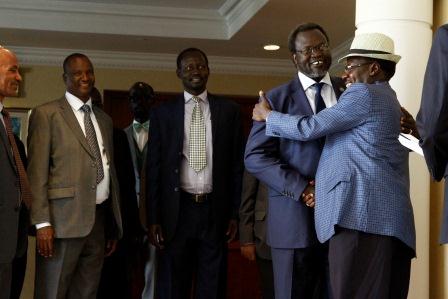Both leaders of the South Sudan conflict have arrived in Ethiopia Friday to meet face-to-face for the first time since the breakout of fighting after a government row in Juba, the capital of South Sudan, December 16.
President Salva Kiir and the leader of the SPLM-SPLA in the Opposition, Dr. Riek Machar, and are scheduled to each meet separately with Ethiopian Prime Minister, Hailemariam Dessalegn, before they meet eachother in Addis Abada, Ethiopia.
After months of fighting and many abandoned opportunities to meet or otherwise resolve the conflict, the two leaders are finally meeting after a visit by UN Secretary Genral Ban Ki-moon and the beginnings of economic sanctions by the US.
Ki-moon arrived in South Sudan Monday and met with Kiir and talked to Machar by satellite phone, garnering promises to meet from both parties.
US Secretary of State, John Kerry also visited South Sudan and threatened economic sanctions if the two warring parties did not desist. The US began the first sanctions earlier this week, affecting one army general from each side of the conflict.
From the government side, a member of the presidential guard, Marial Chunuong, was singled out by the US for leading attacks against civilians in and around the capital, Juba, and from the rebel side leader Peter Gadet was targeted for leading an April 17 assault on the city of Bentiu in which 200 civilians were killed.
Also Friday, a delegation from the government and from rebel leader David Yau Yau’s Democratic Movement-Cobra Faction signed a final agreement in Addis Ababa, Ethiopia, which will end the conflict in Greater Pibor County of Jonglei State. The signatories were Canon Clement Janda, the chairperson of Political and Foreign Relations Committee in the Council of States on behalf of the Government of South Sudan, and General Boutros Khalid, from the Cobra-Faction.
General Boutros Khalid signed on behalf of the Cobra-Faction.
Other progress was made this week, when the two sides signed a recommitment to allow much needed humanitarian provided food supplies to be delivered to people in conflict affected areas. South Sudan is currently facing a major food crisis due to the onset of the rainy season, by which time all crops that will be harvested for next year must be planted, and upon which South Sudan’s scant road system will become mud.
By Day Blakely Donaldson
Source:
